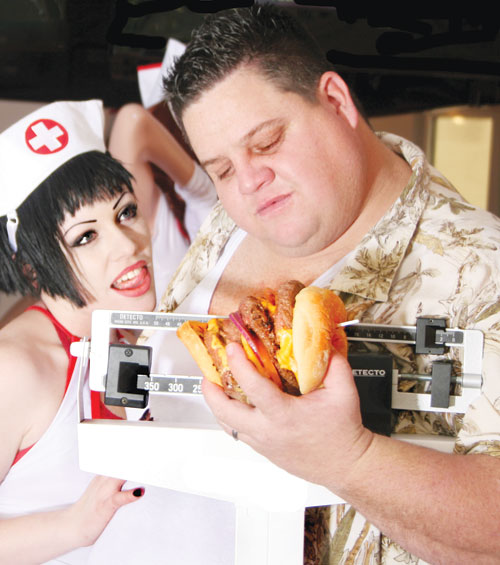
Heart Attack Grill opens in Dallas’ West End on May 13 with the goal of using reverse psychology to raise awareness of rising obesity in America. (Photo courtesy of Heart Attack Grill)
Dressed in a white coat with a stethoscope around his neck, this 5’10,” 195-pound doctor checks on his patients everyday.
This is no ordinary doctor. Actually, he is not a doctor at all.
He is a chef.
“Dr.” Jon Basso, owner of Heart Attack Grill, a restaurant opening in Dallas’ West End on May 13, created a themed restaurant where he uses reverse psychology to share his message about the rising obesity problem in America. The first, and until now only, Heart Attack Grill opened in Chandler, Ariz. in 2005.
At the restaurant, waitresses—dressed as nurses—serve “food for thought,” which includes high-fat offerings such as milkshakes, burgers and lard-soaked fries to their customers who are commonly referred to as patients.
If patients weigh in at more than 350 pounds, they receive a free meal. If they finish a Triple or Quadruple Bypass Burger—a stack of four half-pound patties with bacon and four layers of cheese—they are offered curbside service in a wheelchair.
Dressed in his lab coat, the 46-year-old restaurant owner shares his message of obesity with all his “patients” eating at the Arizona restaurant. The guests dress in surgical gowns that they receive at the door. Basso will continue this tradition when he moves to Dallas and opens his second location.
“Sure, the basic idea is to make money,” Basso said. “But, I’m doing my part to create a diner theater environment which forces such philosophical introspection.”
More than a third of U.S. adults are obese according to the U.S. Centers for Disease Control and Prevention. In 2010, 29 percent of adults in Texas were categorized as obese, placing Texas in the top 15 fattest states that year. According to Texas Public School Nutrition, approximately 30 percent of Texas children are obese or overweight.
While Basso is first to admit that “this is a horrible epidemic and obesity is a horrible thing,” he believes Heart Attack Grill is the only responsible food service in America.
“I provide a valid service—it’s that shock value,” he said.
Though many dieticians and doctors admit the theme of the restaurant is fun, they condemn the message of gluttony and extreme eating.
“We are in such a state of disregard for our health,” Meridan Zerner, a dietitian at the Dallas-based Cooper Aerobics Center, a fitness and wellness clinic said. “It is predicted that our children won’t outlive us.”
SMU Vice President of Executive Affairs and professor of marketing Dr. Tom Barry thinks the irony of the Heart Attack Grill’s message will be lost on many people.
The contrarian viewpoint is that obesity is a good thing or at least not a bad thing and we should eat our heart’s delight, he said. This restaurant is making light of the obesity problem.
In March, Heart Attack Grill made national headlines when its 29-year-old spokesman, Blair Rivers, died of complications from pneumonia. Rivers weighed approximately 600 pounds.
“His death says no more or less about Heart Attack Grill than it does about any of his other lifestyle choices,” Basso said. “We’re all saddened by his death.”
When Dr. Michael Mack, a cardiovascular and thoracic surgeon at Baylor Hospital, started practicing medicine in the 1980s, cigarette smoking was the epidemic. The goal at that time was to get people to stop smoking.
“If you could get them to stop smoking, we thought it would cure so many illness,” Mack said. “But, people just replaced one abuse for another. Obesity is ultimately the worst cigarette.”
While obesity triggers high blood pressure, diabetes and heart disease, it also leads to an increase in hip and knee replacements, according to Mack.
“The body was not made to carry around all this weight,” he said.
Before opening the first Heart Attack Grill in Chandler, Ariz. in 2005, Basso ran Jenny Craig franchises in Oklahoma, his home state.
To Basso, strict dieting is not the most efficient way to curb obesity. He wants to help those who have “hit rock bottom” by playing both the doctor and the villain. Though he serves his patients big portions, he is not hesitant to tell them they should only eat like that occasionally.
“I am still prescribing successful diet programs,” Basso said. “Sure, the majority of my medical colleagues disagree with my recommendations, but my patient base does not.”
Dallasite Dee Raibourn is aware that Heart Attack Grill is opening in Dallas.
“Both the burgers and the theme will cause me to visit at some point,” he said. “But candidly, I probably wouldn’t drive out of my way.”
According to Raibourn, a lawyer, people have the freedom to eat as they please but need to be accountable for their actions.
“People should know that burgers and fries, from wherever, aren’t the healthiest choice,” he said. “So, if people want to eat somewhere that’s over the top in calories and fat, then so be it.”
Barry, a marketing professor at SMU, thinks Heart Attack Grill’s move to Dallas is in part due to the innovativeness of the city.
“It is a ‘happening place,'” he said. “It is economically vibrant and it is a hotbed for businesses, especially entrepreneurs.”
According to Barry, Heart Attack Grill is “an innovative eatery” and consumers are constantly looking for something that stands out and is trendy.
Basso’s tactic is original. He compares his message to the way a person approaches a new software download.
“We are in your face asking, ‘Are you sure? It’s permanent. Are you sure you want to eat this?'” he said. “I always say, ‘Check it out. We have nicotine, caffeine, sodium and cholesterol.'”
The response he gets: laughter.
“People enjoy it, but they know it’s bad,” Basso said.
There used to be a stigma associated with obsession eating and obesity, according to Mack.
“Now, it’s almost like it’s not anymore. It’s more a badge of courage,” he said. “This restaurant is feeding into this national, and Texas, obsession with eating.”
Tara Mason, a mother of two who lives in Dallas, focuses on instilling a healthy lifestyle for her daughters. A trip to Heart Attack Grill is probably not in her future.
“It’s really important to be healthy for my girls and for myself,” she said. “With our hectic lifestyle today, it’s easy to make the choice to pick up fast food every day or eat out.”
Mason said making a home-cooked meal is more time consuming, but to her, it’s more important in the long run to instill healthy eating habits in her children.
A recent report conducted by the University of Wisconsin Population Health Institute and the Robert Wood Johnson Foundation examined 223 counties in Texas. While Collin, Denton and Rockwall Counties ranked in the top five healthiest counties in Texas, Dallas County ranked 50th.
Issues such as health behaviors, clinical care, social and economic factors, physical environment, mortality and morbidity factor into the county’s ranking.
“In the city of Dallas the majority of people do not have access to gyms or other recreation centers,” Zachary Thompson, the director of Dallas County Health & Human Services said. “Most people cannot afford to pay for these facilities monthly.”
Considering factors such as money and health, Basso advises his patients to only come in once a week.
“I’m willing to look out for your wallet, and for you,” he said.

Heart Attack Grill opens in Dallas’ Wes
t End on May 13 with the goal of using reverse psychology to raise awareness of rising obesity in America. (Photo courtesy of Heart Attack Grill)








